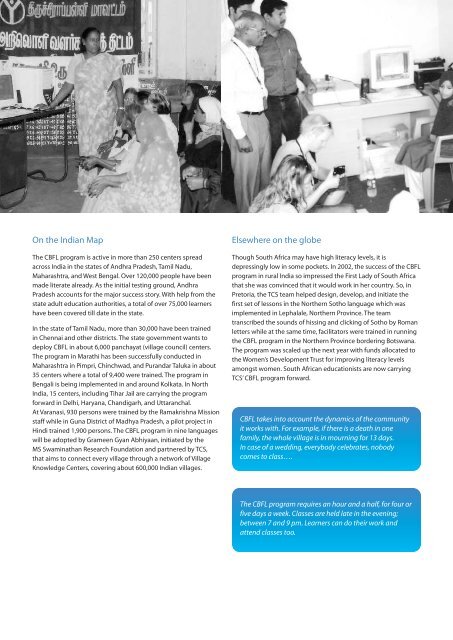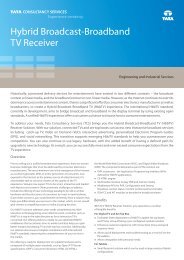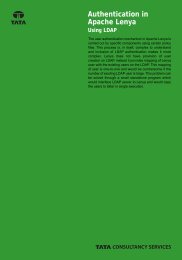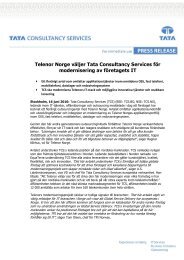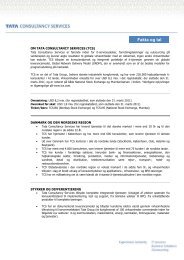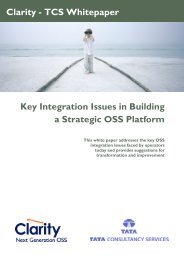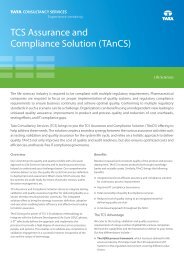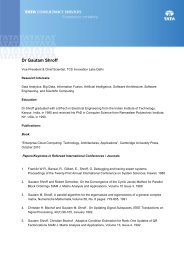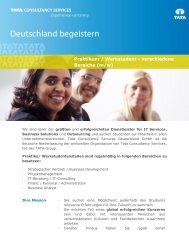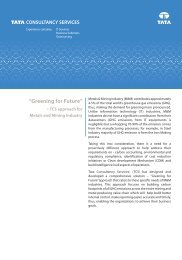Empowerment through learning - Tata Consultancy Services
Empowerment through learning - Tata Consultancy Services
Empowerment through learning - Tata Consultancy Services
Create successful ePaper yourself
Turn your PDF publications into a flip-book with our unique Google optimized e-Paper software.
On the Indian Map<br />
The CBFL program is active in more than 250 centers spread<br />
across India in the states of Andhra Pradesh, Tamil Nadu,<br />
Maharashtra, and West Bengal. Over 120,000 people have been<br />
made literate already. As the initial testing ground, Andhra<br />
Pradesh accounts for the major success story. With help from the<br />
state adult education authorities, a total of over 75,000 learners<br />
have been covered till date in the state.<br />
In the state of Tamil Nadu, more than 30,000 have been trained<br />
in Chennai and other districts. The state government wants to<br />
deploy CBFL in about 6,000 panchayat (village council) centers.<br />
The program in Marathi has been successfully conducted in<br />
Maharashtra in Pimpri, Chinchwad, and Purandar Taluka in about<br />
35 centers where a total of 9,400 were trained. The program in<br />
Bengali is being implemented in and around Kolkata. In North<br />
India, 15 centers, including Tihar Jail are carrying the program<br />
forward in Delhi, Haryana, Chandigarh, and Uttaranchal.<br />
At Varanasi, 930 persons were trained by the Ramakrishna Mission<br />
staff while in Guna District of Madhya Pradesh, a pilot project in<br />
Hindi trained 1,900 persons. The CBFL program in nine languages<br />
will be adopted by Grameen Gyan Abhiyaan, initiated by the<br />
MS Swaminathan Research Foundation and partnered by TCS,<br />
that aims to connect every village <strong>through</strong> a network of Village<br />
Knowledge Centers, covering about 600,000 Indian villages.<br />
Elsewhere on the globe<br />
Though South Africa may have high literacy levels, it is<br />
depressingly low in some pockets. In 2002, the success of the CBFL<br />
program in rural India so impressed the First Lady of South Africa<br />
that she was convinced that it would work in her country. So, in<br />
Pretoria, the TCS team helped design, develop, and initiate the<br />
first set of lessons in the Northern Sotho language which was<br />
implemented in Lephalale, Northern Province. The team<br />
transcribed the sounds of hissing and clicking of Sotho by Roman<br />
letters while at the same time, facilitators were trained in running<br />
the CBFL program in the Northern Province bordering Botswana.<br />
The program was scaled up the next year with funds allocated to<br />
the Women’s Development Trust for improving literacy levels<br />
amongst women. South African educationists are now carrying<br />
TCS’ CBFL program forward.<br />
CBFL takes into account the dynamics of the community<br />
it works with. For example, if there is a death in one<br />
family, the whole village is in mourning for 13 days.<br />
In case of a wedding, everybody celebrates, nobody<br />
comes to class….<br />
The CBFL program requires an hour and a half, for four or<br />
five days a week. Classes are held late in the evening;<br />
between 7 and 9 pm. Learners can do their work and<br />
attend classes too.


